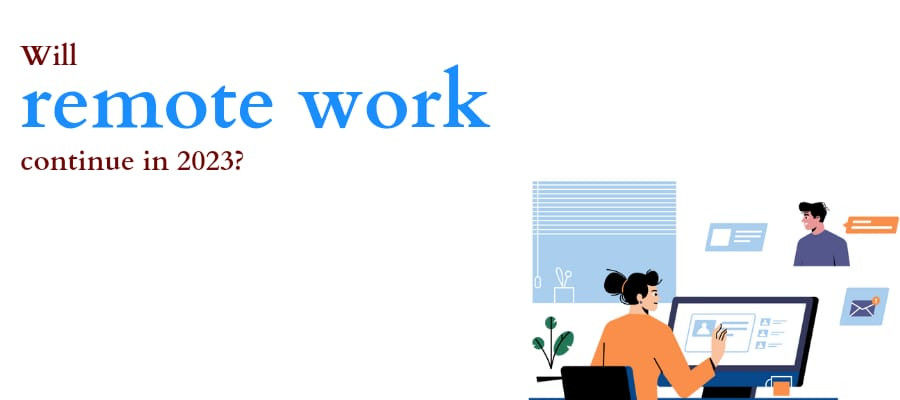Will remote work continue in 2023?

Remote work has become a buzzword in the modern workplace, and with the COVID-19 pandemic accelerating the trend, the future of remote work is a topic of great interest. In this article, we'll take a closer look at the factors that may influence the future of remote work, including technological advancements, employee expectations, and economic impacts. We'll also explore the potential challenges and benefits of remote work and examine the role that Agile methodologies and Scrum practices can play in the future of remote work.
Factors Influencing the Future of Remote Work:
Technological Advancements:
The availability of powerful and affordable technology has been a critical driver of remote work. In 2023, we can expect further technological advancements to make remote work more seamless and efficient. Virtual and augmented reality technologies will likely become more accessible, making remote collaboration and meetings more immersive and compelling.
Employee Expectations:
The COVID-19 pandemic has shown that remote work is possible for many people and has opened up new possibilities for work-life balance. As a result, employees will likely continue to demand the option to work from home, even after the pandemic subsides. This could lead to a shift in workplace culture, where remote work is seen as a normal and expected part of work life.
Economic Impacts:
The economic impact of the pandemic has also been a significant factor in the growth of remote work. Some companies may revert to traditional office-based work as the global economy recovers. Still, others may continue with remote work, recognizing its benefits in cost savings and increased productivity.
Challenges and Benefits of Remote Work:
Challenges:
- Isolation and loneliness: Remote work can be isolating, leading to feelings of loneliness and disconnection from the workplace.
- Cybersecurity threats: With more people working from home, there is a higher risk of data breaches and cyberattacks.
- Management challenges: Remote work can be challenging for managers who are used to managing a traditional office-based workforce.
Benefits:
- Access to a broader talent pool: Companies no longer have to limit their hiring to a specific geographic location, which can open up new opportunities for both the company and the employee.
- Improved work-life balance: Remote work provides employees with greater flexibility and the ability to balance their work and personal life.
- Cost savings: Companies can save on expenses such as rent, utilities, and office supplies by adopting remote work.
The Role of Agile Methodologies and Scrum Practices in Remote Work:
Agile methodologies, such as Scrum, are principles and practices that can be applied to product development, project management, and other business processes. The Scrum framework provides a structured approach to product development, with clear roles and responsibilities and a focus on regular communication, collaboration, and feedback.
Key Roles in Scrum:
- Scrum Master: The Scrum Master is responsible for facilitating the Scrum process and ensuring that the Scrum team follows the Scrum framework.
- Product Owner: The Product Owner is responsible for defining the product backlog, prioritizing the work, and ensuring that the work is aligned with the product vision and strategy.
- Developers: The Developers are responsible for implementing the work and delivering the final product.
Key Scrum Artifacts:
- Product Backlog: The Product Backlog is a prioritized list of user stories or features that must be developed.
- Sprint Backlog: The Sprint Backlog is the work the development team has committed to completing during the upcoming sprint.
- Increment: The Increment is the sum of all the product backlog items completed and accepted during a sprint.
Key Scrum Events:
- Sprint Planning: The Sprint Planning event is where the Scrum team plans and commits to the work completed during the upcoming sprint.
- Daily Scrum: The Daily Scrum is a daily stand-up meeting where the development team reviews progress and plans for the next 24 hours.
- Sprint Review: The Sprint Review is a review of the work completed during the sprint, where the Scrum team demonstrates the work and receives feedback.
- Sprint Retrospective: The Sprint Retrospective is an opportunity for the Scrum team to reflect on the sprint and identify areas for improvement.
Key Scrum Artifacts:
- Product Vision: The Product Vision is a high-level statement that describes the product's purpose and goals.
- Product Strategy: The Product Strategy is a plan for how the product will be developed and delivered.
- Product Roadmap: The Product Roadmap is a visual representation of the product strategy and the work that needs to be completed to achieve the product vision.
- Product Goal: The Product Goal is a statement that defines what the product should achieve in the next sprint.
Conclusion
Remote work is likely to play a significant role in the future of work, influenced by technological advancements, employee expectations, and economic impacts. While remote work has challenges, it also offers significant benefits, including improved work-life balance, access to a broader pool of talent, and cost savings. Agile methodologies, such as Scrum, can play a crucial role in supporting remote work by providing a structured approach to product development and project management, with clear roles and responsibilities, regular communication and collaboration, and opportunities for improvement.
Whether you are an Agile Leader or an Agile Practitioner, it is essential to stay informed about the latest trends and best practices in Agile and Scrum. Agile and Scrum training, coaching, and education are critical components of a successful Agile and Scrum transformation. They can help you build the skills and knowledge you need to succeed in a rapidly changing workplace. So, embrace the future of remote work and start your Agile and Scrum journey today!



